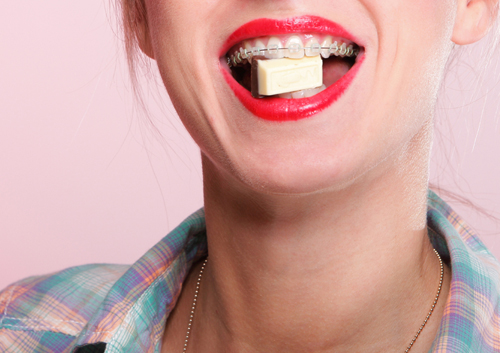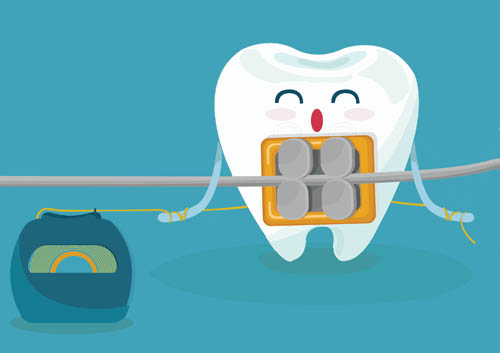August 10th, 2016

Temporomandibular joint disorders (TMD) describe a set of conditions that involve trouble with your jaw and face muscles. They result from a problem in the temporomandibular joint (TMJ), which is a hinge that connects the temporal bones, in your skull in front of each ear, to your jaw. The joint enables you to talk, yawn, and chew by letting your mouth move.
TMD can be very painful and interfere with functions such as eating and speaking. This what to watch for and how to try to prevent TMD.
Risk Factors for TMD
You are at higher risk for TMD if you are a women than if you are male. The disorder is most common among adults between the ages of 20 and 40 years. Other risk factors for TMJ disorders include the following.
- Arthritis in the area, making movement more difficult
- Excessive tooth grinding, because it increases stress on the joint
- General stress, which can lead you to clench your teeth and strain facial muscles
Symptoms of TMD
Symptoms of TMD can last for just a short while, or for several years. Seeing Dr. Jones is important if your symptoms make it impossible for you to eat regularly or if you have unbearable pain or discomfort. The following symptoms can occur on both or one side of your face.
- Aching or very tired facial muscles
- Jaws that are fixed open or shut without you being able to unlock them
- Grating or popping sounds when you chew or close or open your mouth
- Pain in the entire area, including the mouth, jaw, neck, or shoulders, that comes on when you chew or yawn
Preventing TMD
You can try to prevent TMD by focusing on reducing risk factors. If you grind your teeth at night, ask Dr. Jones about wearing a mouthguard. If you are overly stressed, look into ways to better manage your stress and relax your muscles. Another strategy for trying to prevent the development of TMD is to avoid chewing gum, since that puts stress on your jaw.
If you have questions about TMD, don’t hesitate to contact our Phoenix, AZ office.
August 3rd, 2016

At Clark Jones, DDS, MSD, Dr. Jones and our staff have found that patients who like their smiles have better self-esteem. People who don’t like their smiles are often skittish about talking to other people. According to the National Women’s Health Resource Center, when women are asked about what they’d most like to change about themselves, many point to their smile. Despite wanting to change their smiles, quite a few of the people who are unhappy about that part of themselves won’t consider getting braces.
Most Americans Don’t Have Straight Teeth
The American Association of Orthodontics estimates that 4.5 million Americans wear braces or other orthodontic equipment to straighten their teeth and to get a healthier mouth. One in five of those braces wearers are women. The organization’s statistics also show that about 75 percent of the population doesn’t have straight teeth, and those people would benefit from getting braces.
While the main benefit of braces is straight teeth, and to improve the look of your smile, there are other benefits that make braces even more useful, including:
- Straighter teeth help people chew better.
- Straighter teeth give people a proper bite.
- People speak better when they have straighter teeth.
- When people have straight teeth, they have better overall gum and mouth health. A healthier mouth means flossing and brushing are easier, and that means your entire mouth stays healthy.
- A healthy mouth is also linked to a healthy body.
When you feel proud of those pearly whites, you feel better about your smile, and that contributes to a better self-image and improved self-esteem. Ultimately, that can lead to greater career success and a more fulfilling social life.
July 27th, 2016

Sticky, hard, and gooey: these candies fill your dopamine receptors with spasms of sugar-filled joy, but if you’re undergoing orthodontic treatment at Clark Jones, DDS, MSD to straighten your teeth, then these sweets are not so sweet. While you may have a Willy-Wonka-sized sweet tooth, there are some candies you’re going to have to avoid while wearing braces.
Here are five bracket- and wire-destroying culprits that Dr. Jones and our team recommend leaving on the candy aisle and not put in your mouth, no matter how tempting they may be.
- Gum is sticky and stringy. It can get tangled like fishing net in your braces. You don’t want to be that boy or girl trying to pull knots of Wrigley’s out of your braces without being seen.
- All chewy, gooey candies need to be avoided. When you’re wearing braces, don’t even think about putting a caramel candy in your mouth. Caramel will not only stick to your braces, making it look as if you haven’t brushed your teeth in a week, but the gooey texture can pull apart the wires, and trigger an emergency visit to Clark Jones, DDS, MSD.
- Hard candy may seem like a safe choice, but it’s not. What’s the problem? Nobody ever just sucks on hard candy; sooner or later, we bite down on it. Biting a hard candy may cause part of your braces to snap. Furthermore, once the candy is broken into a bunch of little pieces, it’s not uncommon for one of those sugary shards to get wedged between your braces and teeth … and that’s a cavity waiting to happen.
- The taffy you enjoy getting at a seaside boardwalk is going to have to go on the back burner. Like caramel, taffy can pull apart and damage your braces. You don’t want to have your expensive orthodontic gear replaced.
- Please, just one lollipop? Nope. A lollipop is nothing more than hard candy on a stick. If you can’t have hard candy during orthodontic treatment, then you shouldn't have hard candy on a stick either.
Have any more questions about what you can and can’t eat when you have braces? Please give us a call at our convenient Phoenix, AZ office to learn more, or ask Dr. Jones during your next adjustment visit!
July 20th, 2016

The Clark Jones, DDS, MSD team knows that oral hygiene is important, whether you have braces on your teeth or not. But if you are a person who wears braces, caring for your teeth and gums can become somewhat challenging. Without daily oral hygiene practices, you may become prone to cavities and tooth decay during your time in braces.
Naturally, you know that brushing your teeth each morning and night, as well as after you eat, will help keep your mouth healthy and clean during the months you wear braces. But flossing is also an important part of your hygiene routine. Flossing with braces can be tricky, but it’s not impossible. Dr. Jones, your general dentist, or your dental hygienist can help you become more comfortable and adept at flossing your teeth during the months you wear braces.
Flossing Tips for Those with Braces
- Use Tools Provided by Our Office. A floss threader is a small, plastic needle that will help you floss between the wires and your teeth. Thread a 12-to-18-inch piece of floss onto the needle, and use the needle to get the floss easily behind the wires.
- Flossing Under the Wires. Once the floss is behind the wires, use your hands to manipulate the floss. Move it up and down along the wires to remove food particles.
- Flossing Between Your Teeth. Floss between your teeth as you normally would without braces. Move the floss up and down between your teeth, using a clean section of floss for each tooth.
- After You Finish Flossing. Your orthodontist may have suggested that you use a water pik or proxy brush after you finish brushing. Either of these tools will help remove any loosened food particles to ensure that your teeth and braces are clean.
Continue Good Oral Hygiene Habits
Good oral hygiene habits you use while wearing braces will help you achieve the beautiful smile you and the Clark Jones, DDS, MSD team have been working toward. Once your braces are off, it may be tempting to slack off on the brushing and flossing. Don’t let yourself fall into any habits that will have a negative impact on your oral health or the attractive smile you waited for throughout the months you wore braces. See your general dentist for regular cleanings, and continue to brush and floss your teeth each day.





